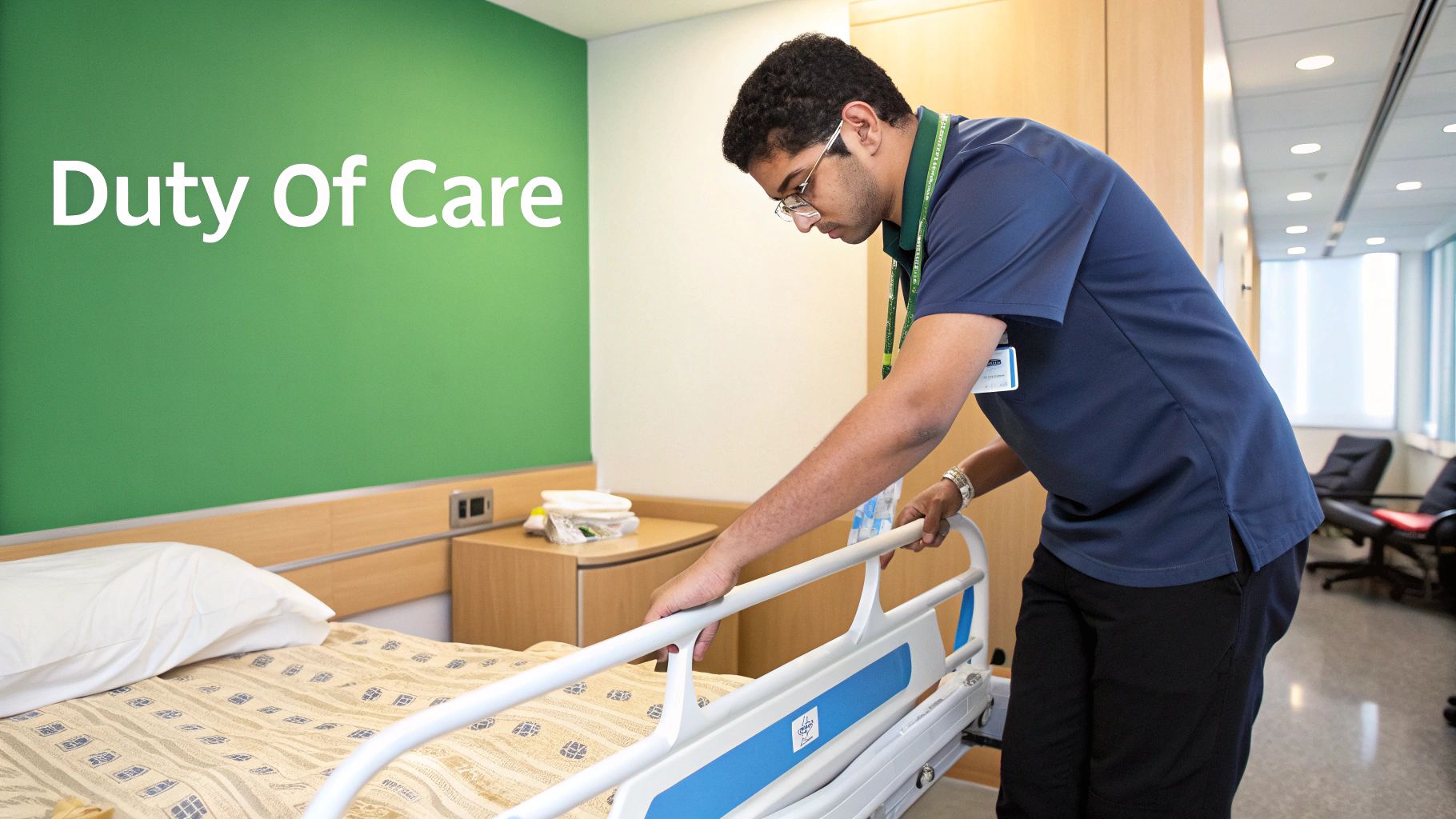
Ever wondered what jobs you could do with a health and social care level 3 qualification? It’s your key to a professional career in one of the UK's most essential sectors, opening doors to roles where you can genuinely make a difference. This guide will walk you through the rewarding jobs available and show you how an online course can get you there.
What is Health and Social Care?
Picture a career where you support people every day to live fuller, healthier, and more independent lives. That’s the heart of health and social care. It’s a cornerstone of UK society, and compassionate, skilled professionals are always in high demand. If you're looking for a stable and fulfilling career, this sector offers endless opportunities.
But how do you get started? For many, the journey begins with a qualification that proves you have the right skills. This is where a health and social care level 3 course comes in. It’s the key that unlocks a huge range of roles, from assisting nurses on a busy hospital ward to providing vital support in a residential care home.
Why Are Care Professionals in Such High Demand?
The need for qualified care workers is a critical national priority. With an ageing population and people living longer with more complex health conditions, the demand for skilled support is constantly growing. As more individuals require help, the sector has to expand, creating fantastic job security for anyone with the right qualifications.
The numbers speak for themselves. As of 31 March 2025, for instance, around 489,000 people in England were receiving long-term adult social care arranged by local authorities – an increase on the previous year. You can explore these trends in the UK government's monthly statistics on adult social care. This growth means completing a Level 3 qualification puts you in the perfect position for a stable, long-term career.
What Does a Level 3 Qualification Mean?
A Level 3 qualification is more than just an entry ticket; it's solid proof that you understand the core principles of quality care. It shows you’ve built a strong foundation in crucial areas, including:
-
Person-Centred Care: Putting an individual’s needs, preferences, and values at the heart of the support you provide.
-
Safeguarding and Protection: Understanding your legal and ethical duties to protect vulnerable people from harm.
-
Health and Safety: Gaining practical knowledge to maintain a safe environment for everyone.
-
Communication Skills: Developing the ability to communicate clearly and empathetically with individuals, their families, and other professionals.
This qualification bridges the gap between basic awareness and professional competence, giving you the confidence and skills to tackle real-world challenges in any care setting.
What Jobs Can You Get with a Level 3 Qualification?
Finishing your health and social care level 3 qualification opens up a world of rewarding, hands-on careers. This isn’t just about finding a job; it’s about starting a career where you can see the positive impact you have on your community every single day.
The sector is expanding fast. The adult social care workforce in England added 52,000 new roles in 2024/25, a jump of 3.4%. It's estimated that by 2040, an extra 470,000 workers will be needed. You can dive into the full workforce data from Skills for Care to understand the scale of this opportunity.
Key Frontline Roles
With a Level 3 qualification, you’re perfectly positioned for roles with more responsibility.
A popular route is becoming a Senior Care Assistant. In this role, you’ll not only provide direct care but also act as a leader and mentor. Your day might involve supervising a team, creating personalised care plans, administering medication, and being the main contact for families. You’ll typically find these roles in residential homes or supported living facilities.
Another crucial role is the Healthcare Assistant (HCA), often found in clinical settings like hospitals or GP surgeries. As an HCA, you'll work alongside nurses and doctors, handling tasks like taking patient observations, assisting with personal care, and supporting the medical team.
Making a Difference in the Community
Your skills aren't just for hospitals or care homes. Many graduates find immense satisfaction working as a Support Worker in the community. This role is incredibly diverse and focuses on helping individuals live more independently.
One day, you might be supporting an adult with a learning disability with daily tasks. The next, you could be offering emotional support to someone with mental health challenges. This path requires patience, creativity, and a real passion for empowering others.
Career Pathways at a Glance
A Level 3 qualification is a brilliant launchpad. After gaining some experience, you can specialise. The table below shows where your qualification can take you.
|
Job Role |
Key Responsibilities |
Typical Work Environment |
Potential Next Steps |
|---|---|---|---|
|
Senior Care Assistant |
Supervising care teams, creating care plans, administering medication, liaising with families. |
Residential homes, nursing homes, assisted living. |
Deputy Manager, Registered Care Home Manager, Level 4/5 study. |
|
Healthcare Assistant (HCA) |
Taking patient vitals, assisting with personal care, supporting nurses with clinical duties. |
Hospitals, GP surgeries, community health clinics. |
Trainee Nursing Associate, nursing degree. |
|
Support Worker |
Assisting with daily living, providing emotional support, helping people access community services. |
Individuals’ homes, community centres, supported living. |
Specialist Support Worker (e.g., mental health), Team Leader. |
|
Dementia Care Worker |
Providing specialised, person-centred care to improve quality of life for those with dementia. |
Specialised care homes, day centres, community support. |
Dementia Lead/Champion, care management roles. |
These are just a few of the paths available. Each role offers a unique way to apply your skills and build a career that genuinely matters.
Your Level 3 qualification is the first major step. From there, you can progress to Level 4 or 5 diplomas, move into management, or use it as a pathway to a university degree in nursing, social work, or occupational therapy.
If adult care is your passion, it’s worth exploring the NCFE CACHE Level 3 Diploma in Adult Care (RQF), which provides a dedicated route into this field.
Why is a Career in Care So Rewarding?
What makes a career in health and social care so much more than just a job? Few professions offer the deep, personal satisfaction that comes from making someone's life better. This field is built on human connection, where your work has a visible, positive impact.
It’s about the sense of purpose you get when you help someone through a tough day, share a laugh with a resident who’s feeling lonely, or build a bond of trust with someone who depends on you. For people driven by compassion, this line of work is a true calling.

The Emotional and Personal Benefits
Working in care comes with unique emotional rewards. You become a key figure in people’s lives, offering them comfort, stability, and dignity when they are most vulnerable.
This creates an incredible feeling of fulfilment. Here’s how:
-
Building Genuine Connections: You form strong, trusting relationships and learn people's life stories.
-
Seeing Tangible Results: You can see the direct results of your compassion, whether you're helping someone regain independence or simply brightening their day.
-
Becoming a Trusted Figure: You become a source of comfort and reassurance for individuals and their families.
Practical Career Advantages
On top of the emotional fulfilment, a career in health and social care offers significant practical advantages. The sector is known for its stability and growth, which means excellent job security. With a health and social care level 3 qualification, you are building a secure future.
Another major benefit is the variety of progression routes. You can specialise in areas like dementia care, move into management, or use your qualification as a springboard to university. The skills you develop are also highly transferable, making you a valuable asset in any people-focused role.
The combination of personal satisfaction and professional stability is rare. In care, you get to build a sustainable career while doing work that truly aligns with your values.
The scale of the sector highlights its importance. In August 2025, there were 353,659 residents in care homes across England. The fact that visitor capacity has returned to around 99% since the pandemic shows how vital family and community support are. You can explore more about the crucial role of the social care sector on GOV.UK.
Real-Life Scenarios: The Impact You Can Make
Imagine being a support worker for a young adult with learning disabilities. You might help them cook a meal for the first time or join a local club to make friends. The pride they gain is a direct result of your guidance.
Or, picture yourself as a senior care assistant. An elderly resident might feel withdrawn after a hospital stay. By listening and encouraging them to join activities, you help them reconnect and rediscover joy. These are the daily victories that make a career in care so profoundly rewarding.
How You Can Study a Level 3 Course Online
Ready to start a career in care but worried about juggling studies with your life? Online learning makes it easier than ever to earn a respected qualification without putting everything else on hold.
This flexible approach is perfect for adult learners, parents, or anyone already working. Let’s look at how you can achieve your career goals with a course designed for real-world success.
Your Pathway: The Access to HE Diploma
For aspiring care professionals, the ideal route is an online course that delivers both flexibility and quality. The Access to Higher Education Diploma (Health and Social Care) from Stonebridge Associated Colleges is a nationally recognised qualification designed to prepare you for university or more senior care roles.
Studying online puts you in control. You can learn whenever it works for you, whether that’s early in the morning or late at night. Forget rigid timetables; this is about balancing your education with your life.

This diploma is an established route to higher education, making it the perfect launchpad for careers in nursing, social work, or other health professions.
Benefits of Studying Online with Stonebridge
Choosing to study your health and social care level 3 equivalent online offers many advantages:
-
Study from Anywhere: All you need is an internet connection.
-
Progress at Your Own Pace: You set the schedule. Power through modules when you have time, or ease off when life gets busy.
-
Dedicated Tutor Support: You're never alone. A personal tutor—an expert in the field—is there to offer guidance and feedback.
-
Develop Essential Digital Skills: Studying online naturally builds your digital literacy and time-management skills.
Online Study vs. Traditional College
Let’s quickly compare an online diploma with a traditional college course.
|
Feature |
Stonebridge Online Diploma |
Traditional College |
|---|---|---|
|
Flexibility |
Study anytime, anywhere, fitting it around your life. |
Fixed timetables require you to be on campus at set times. |
|
Pacing |
You control the pace, finishing as quickly or slowly as needed. |
The whole class moves at the same speed. |
|
Cost |
Often more affordable with no travel or accommodation costs. |
Includes tuition fees plus extra costs for transport and materials. |
|
Support |
Personalised, one-to-one support from a dedicated tutor. |
Support is shared among a whole class during set hours. |
For adult learners, the flexibility of an online course like the Stonebridge Access to HE Diploma is often the deciding factor. It empowers you to pursue your ambitions without sacrificing your income or family time.
A Flexible Way to Fund Your Course
Worried about the cost? Financial concerns shouldn't stand between you and your career goals. That's why Stonebridge offers a modern, flexible approach to paying for your course.
We’ve replaced complicated credit agreements with a straightforward subscription model. Think of it like a streaming service for your education. You pay one simple, manageable monthly fee for full access to your course materials, assignments, and one-to-one tutor support.
Putting You in Control of Your Finances
This model gives you freedom. Traditional student finance can lock you into debt for years, but our subscription method avoids that pressure.
Here’s why it works so well:
-
No Long-Term Credit Agreements: You aren’t signing a stressful financial contract. No credit checks, no debt.
-
Complete Flexibility: If your circumstances change, you can pause or cancel your subscription at any time. You’re always in control.
-
Affordable: Breaking the cost into small monthly payments makes high-quality qualifications more achievable. Budgeting for your future becomes simple.
This payment structure gives you peace of mind so you can focus on your studies. If you're weighing up your options, you can learn more about payment options for your Stonebridge course and see how our model compares.
This subscription model is our commitment to making education accessible. It ensures your ambition to work in health and social care isn’t held back by financial hurdles.
How Subscription Learning Works
Getting started is simple. Once you enrol on your Access to Higher Education Diploma (Health and Social Care), your monthly payments begin. You get everything you need to succeed right away, including all course content and a direct line to your personal tutor.
There are no hidden costs. You can work through your modules at your own pace, submitting assignments whenever you’re ready, all while your monthly payment stays the same. Need to take a break? Just pause your subscription and pick it up again when you’re ready.
With over 20 years of experience, Stonebridge delivers career-focused programmes for adult learners. Our model is built on trust and a genuine desire to see you succeed.
Ready to Start Your Career in Care?
You have the drive, and now you have a clear path forward. The need for skilled, compassionate care professionals is greater than ever, and a rewarding career is well within your reach.
It all begins with the right qualification. The Stonebridge Access to Higher Education Diploma (Health and Social Care) is your direct route to making a genuine difference.
Your Next Steps
We’ve made getting started as simple as possible.
-
Explore the Course: Visit the course page to see the curriculum and learn about the tutor support you’ll receive.
-
Enrol Online: Signing up is easy. Our flexible subscription model means you can start with a simple monthly payment, with no long-term credit agreements.
-
Start Learning: Once enrolled, you’ll get immediate access to your course materials and a welcome from your personal tutor. Dive into your first module straight away.
A career in care offers a rare blend of stability and personal fulfilment. You’re not just starting a course; you’re investing in a future where your work has a positive impact on people’s lives every single day.
If you’re ready to learn more about the practical side of this career, check out this great advice on how to become a caregiver. Your new future is just a few clicks away.
Frequently Asked Questions
Thinking about a new career always brings up questions. Here are answers to some of the most common queries about the health and social care level 3 qualification and studying online with Stonebridge.
Is the Access to HE Diploma recognised by universities?
Yes, absolutely. The Access to Higher Education Diploma is a nationally recognised Level 3 qualification designed as an alternative to A-Levels for adult learners. It is regulated by the Quality Assurance Agency for Higher Education (QAA), so universities across the UK accept it for entry into degrees like nursing, social work, and midwifery.
Do I need previous qualifications to enrol?
You generally don’t need specific A-Levels. However, you will likely need GCSEs in English and Maths – or an equivalent qualification – at grade C/4 or above, as this is a standard university requirement for most degree programmes. The diploma itself will give you all the academic skills you need to succeed in higher education.
How long does the online course take?
The beauty of studying with Stonebridge is its flexibility. The course is 100% online, so you are in control. Most learners complete the diploma in 9 to 12 months, but you have up to two years. This self-paced style means you can fit your studies around your life.
What kind of support will I receive?
Studying online doesn’t mean you’re alone. From the moment you enrol, you will be paired with a dedicated personal tutor who is an expert in the health and social care sector. They are your go-to for guidance, answering questions, and providing detailed feedback to help you improve.
Your tutor acts as your personal mentor throughout the course, ensuring you have all the expert support you need to succeed. It's this personal touch that helps our students stay motivated and on track.
Ready to take the first step towards a career that truly matters? With Stonebridge Associated Colleges, you can gain a recognised qualification on your own terms. Explore the Access to Higher Education Diploma (Health and Social Care) and enrol today.




